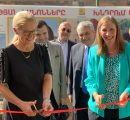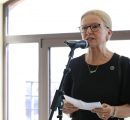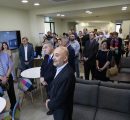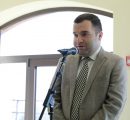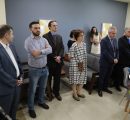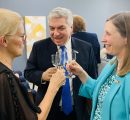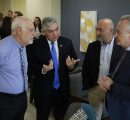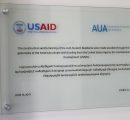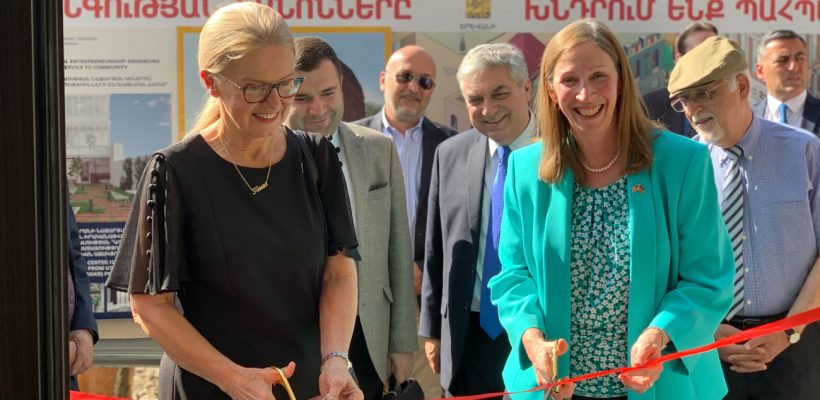
Official Opening of USAID/ASHA-Funded AUA Student Residence
4 min readYEREVAN, Armenia — On June 17, 2021, the U.S. Agency for International Development (USAID)/American Schools and Hospitals Abroad (ASHA)-funded Student Residence at the American University of Armenia (AUA) officially opened its doors. The long-awaited opening was met with enthusiasm, as AUA community members, U.S. government representatives, USAID staff, Ministry of Education representatives, and other supporters gathered to commemorate the monumental occasion.
The story of the Student Residence began in 2016, when philanthropists K. George and Dr. Carolann Najarian donated a semi-constructed building in the Dzoragyugh district of Yerevan to AUA. Well known for their philanthropic work in Armenia since the days of the Spitak Earthquake and the Karabakh Movement, the Najarians have been long-time supporters of the University. The couple have a longstanding relationship with AUA, dating back to the mid-1990s when Dr. Carolann Najarian lectured at the University on primary health care. The University’s School of Public Health had just launched at the time, and the concept of primary care in Armenia was practically nonexistent. Dr. Haroutune Armenian, the President of AUA at the time, sought out Dr. Najarian’s expertise to help get the Master of Public Health program off the ground.
In 2017, the University was awarded a generous grant of $999,000 by USAID’s ASHA program, for the construction, renovation, and furnishing of the site to accommodate AUA students. The construction was completed in March 2021.
Now open, the AUA Student Residence will soon house 56 students from Armenia’s regions and abroad. The completed building has four floors and 28 rooms, each room containing an individual heating and cooling unit, refrigerator, storage, and private bathroom. The facility was constructed to be inclusive and accessible for all students — ramps, an elevator, and large bathrooms on the first floor ensure that students with disabilities can easily navigate the building.
The opening ceremony kicked off with a ribbon cutting by AUA President Dr. Karin Markides and U.S. Ambassador to Armenia Lynne M. Tracy. USAID Mission Director John G. Allelo and other USAID staff were in attendance. President Markides gave welcoming remarks, mentioning that “The AUA community has long waited for this addition to the University campus. It is a major gift to our students in the year of celebration of the 30th anniversary of AUA’s establishment. AUA students and the entire community remain forever grateful to USAID/ASHA for its support in this new milestone development in the University’s history.”
RA Deputy Minister of Education, Science, Culture, and Sport Karen Trchunyan and Director of USAID’s Local, Faith, and Transformative Partnerships Hub, which oversees the ASHA program, Adam Phillips also gave congratulatory remarks.
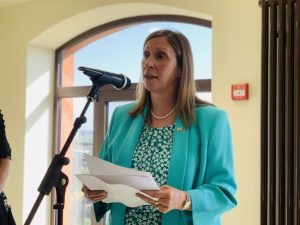 “I truly believe that the newly-established Student Residence is an important step in advancing the University’s position as a center of academic excellence, innovation, inquiry, and diversity. This is the first dormitory for the University and the most modern of any institution of higher education in Armenia. Because of it, students from Armenian marzes and abroad will now have the ability to reside in Yerevan and enjoy the opportunity to participate in AUA’s world-class academic programs, initiatives, and research centers. Moreover, this space will foster knowledge and experience sharing, as well as diversity and international cooperation,” shared U.S. Ambassador to Armenia Lynne M. Tracy.
“I truly believe that the newly-established Student Residence is an important step in advancing the University’s position as a center of academic excellence, innovation, inquiry, and diversity. This is the first dormitory for the University and the most modern of any institution of higher education in Armenia. Because of it, students from Armenian marzes and abroad will now have the ability to reside in Yerevan and enjoy the opportunity to participate in AUA’s world-class academic programs, initiatives, and research centers. Moreover, this space will foster knowledge and experience sharing, as well as diversity and international cooperation,” shared U.S. Ambassador to Armenia Lynne M. Tracy.
Through communal living and engagement, the AUA Student Residence will serve as a platform to foster the sharing of knowledge and appreciation of cultural differences among resident international and local students. Spaces designed for professional activities and social gatherings provide a well-rounded experience, with a lounge area, kitchen, and study room on the ground floor. The facility is equipped with wireless internet access, laundry machines, and private and communal balconies. In line with AUA’s sustainable values, the Student Residence building is topped with solar panels which generate energy to support the water-heating system. Furthermore, not only does the building have 24-hour security, but doors to rooms are equipped with an access control system and can only be opened via ID cards.
Communal balconies grant students the space to gather with their classmates to reflect on their days and share their ideas as the sun sets over the Hrazdan river with Mount Ararat on the horizon. These seemingly inconsequential moments have the capacity to shed light on identities, values, and aspirations. This addition to the University’s infrastructure will promote democratic values — diversity, inclusion, gender equality, community building, and student engagement and empowerment. In such challenging times for the Armenian nation, it is more important than ever for the future leaders of Armenia — and indeed, the world — to have access to such spaces, through which they will find hope in the collective future and recognize their role in it.
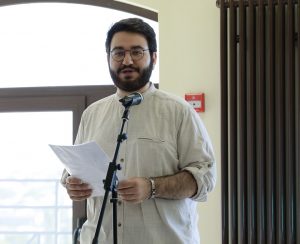 “The Residence will open the gates for us to welcome more international students to our beloved University, and increase our chances of networking and help us build bridges with people from all over the world. It is indeed an exciting opportunity for all of us,” added AUA student Armen Torossian (BAEC ‘23).
“The Residence will open the gates for us to welcome more international students to our beloved University, and increase our chances of networking and help us build bridges with people from all over the world. It is indeed an exciting opportunity for all of us,” added AUA student Armen Torossian (BAEC ‘23).
Speeches were followed by a tour and reception, during which members of the AUA, USAID, and RA Ministry communities marveled at the new space.
Founded in 1991, the American University of Armenia (AUA) is a private, independent university located in Yerevan, Armenia, affiliated with the University of California, and accredited by the WASC Senior College and University Commission in the United States. AUA provides local and international students with Western-style education through top-quality undergraduate, graduate, and certificate programs, promotes research and innovation, encourages civic engagement and community service, and fosters democratic values.
- AUA President Dr. Karin Markides and U.S. Ambassador to Armenia Lynne M. Tracy
- AUA President Dr. Karin Markides
- RA Deputy Minister of Education, Science, Culture, and Sport Karen Trchunyan
- AUA President Dr. Karin Markides, USAID Mission Director John G. Allelo, and U.S. Ambassador to Armenia Lynne M. Tracy

